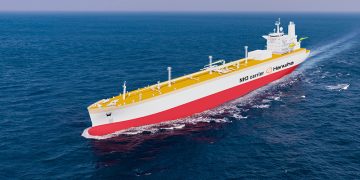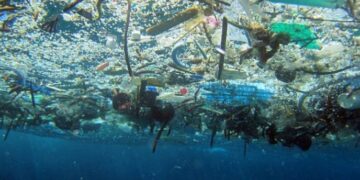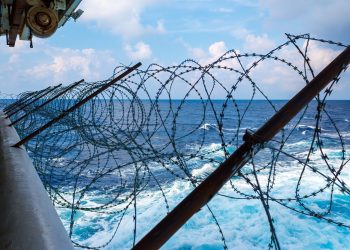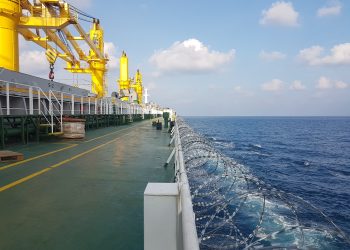In an exclusive interview, Capt. Yves Vandenborn, Director of Loss Prevention, The Standard Club, introduces Standard Club’s series of Masters’ Guides which are a compilation of the experience and expertise of their Loss Prevention professionals and industry experts, focusing on best practices for enhanced safety at sea.
As explained, all Guides, 9 in total, have been revised and aligned with today’s challenges and regulations while currently their team is working on writing a new Master’s Guide focusing on ECDIS. This guide is considered as a necessary addition due to a survey deficiency analysis which raised concern with the level of understanding watch keepers have of the risks associated with the use of ECDIS for navigation, Capt. Vandenborn stated.
SAFETY4SEA: Tell us a few words about Standard Club’s series of Masters’ Guides; when were they firstly published and what is their objective?
Capt. Yves Vandenborn: As part of the Loss Prevention department’s continuing commitment to safety at sea, several ‘Master’s Guides’ have been produced, and revised over the years, which focus on delivering best practice advice on key areas of vessel operations to avert avoidable claims and prevent accidents, casualties and incidents at sea. These guides were created by harnessing the professional knowledge of experienced mariners within the Loss Prevention team, assisted by subject area experts from the marine industry.
S4S: What is the reason behind the development of these guides? Have you noticed any particular needs?
Capt Y.V: The club continually monitors claims to identify trends and causes of incidents, and with further analysis the Loss Prevention department have identified key areas whereby further guidance and best practice advice on key areas of vessel operations could avert avoidable claims and prevent accidents, casualties and incidents at sea. For example, there has been an increase in claims involving lost containers at sea and this has prompted the team to review the potential causes of it and release an updated version of our Master’s Guide to Container Securing.
Similarly, from our claims trend analysis and ship survey deficiency lists, we have confirmed a number of other particular needs, which led to the review of all of our Master’s Guides and the development of a new guide on ECDIS.
S4S: Where can operators find Club’s Masters’ Guides? Are you planning to develop new ones within the year?
Capt Y.V: All of our Master’s Guides can be found on our website, for free. There are currently nine in total. In recent months, A Master’s Guide to; Enclosed Space Entry, Carriage of Steel Cargo, Container Securing, Berthing, and Ship’s piping were all updated and published. Work is underway to update all other guides including A Master’s Guide to Hatch cover maintenance this year. To follow this, the team are working on writing a new guide focusing on ECDIS, which will also be published this year.
S4S: Amid the COVID-19 crisis, what are currently the key loss prevention challenges for ship operators?
Capt Y.V: The outbreak of COVID-19 has compelled many parts of the world to enforce public lockdowns to reduce infection transmissions among the population. International borders have been closed and modes of transport internationally, nationally, and locally have been drastically reduced. These heightened entry/exit requirements and absence of international movement have derailed crew changes.
Seafarers face increased anxiety and stress levels as they are unable to join ships and must remain in lockdown at their homes. No work means no income, and this directly threatens the families, and even the extended families’ financial income and stability if the seafarer is the sole breadwinner, which is often the case. This greatly affects seafarers’ mental and physical wellbeing. The Loss Prevention department is committed to raising awareness of seafarer wellbeing and share more resources to support seafarer wellbeing on the club’s website.
S4S: What issues related to loss prevention should the industry further consider?
Capt. Y.V. : In Dec 2020, the International Group of P&I clubs released a report on P&I claims involving vessels under pilotage. In addition, we have noticed that a high percentage of annual pool claims (excess $10m) are navigation related. As such, we believe that navigation and bridge team management should be at the forefront of ship managers’ minds. This is a key focus for the club’s Loss Prevention department this year.
S4S: Through the development of your guides, have you identified any additional areas/topics for industry’s stakeholders to consider further best practices and/or more regulation?
Capt. Y.V. : The Loss Prevention department is core to the club’s continuing strategy to provide its members with sustainable, good value cover with excellent financial security and a high-quality membership. As such providing expert LP advice on best practices to avert claims goes a long way in keeping with those objectives.
In its continuing commitment to safety at sea and the prevention of accidents, casualties and pollution, the club issues a variety of publications on safety-related subjects to help seafarers understand the value of best practice and how it is in their best interest and safety to comply.
As previously mentioned, the team are working on writing a new Master’s Guide focusing on ECDIS. This was identified to be necessary as a result of our survey deficiency analysis raising concern with the level of understanding watch keepers have of the risks associated with the use of ECDIS for navigation. Too frequently we find that watch keepers over rely on electronic means of navigation and do not properly understand its limitations. This new guide will assist seafarers in better understanding their ECDIS.
S4S: Is there anything you would like to see operators do differently or better with regards to loss prevention?
Capt. Y.V. : A sense of urgency and emphasis is not always applied equally by all seafarers when it comes to training. We often get the impression that many seafarers are less diligent when filling in checklists and treat the process of going through the procedures as a mundane exercise that is not important. This stems from a lack of understanding of how these processes and checklists are instrumental to their safety at sea. We encourage our members and their crews to commit to high-quality, continuous professional development and training so that competent personnel can perform their work safely and efficiently at all times.
S4S: What is your key message to operators with regards to your ‘Master’s Guides’?
Capt. Y.V. : The Master’s Guides are a compilation of the experience and expertise of our Loss Prevention professionals and industry experts. The Guides have been revised and aligned with today’s challenges and regulations. Members, Operators and their crews can access them for free on our website. Read them, circulate them, and use them as training material. Our team are available to conduct training sessions/webinars for members should the need arise.
The views presented hereabove are only those of the author and do not necessarily those of SAFETY4SEA and are for information sharing and discussion purposes only.































































